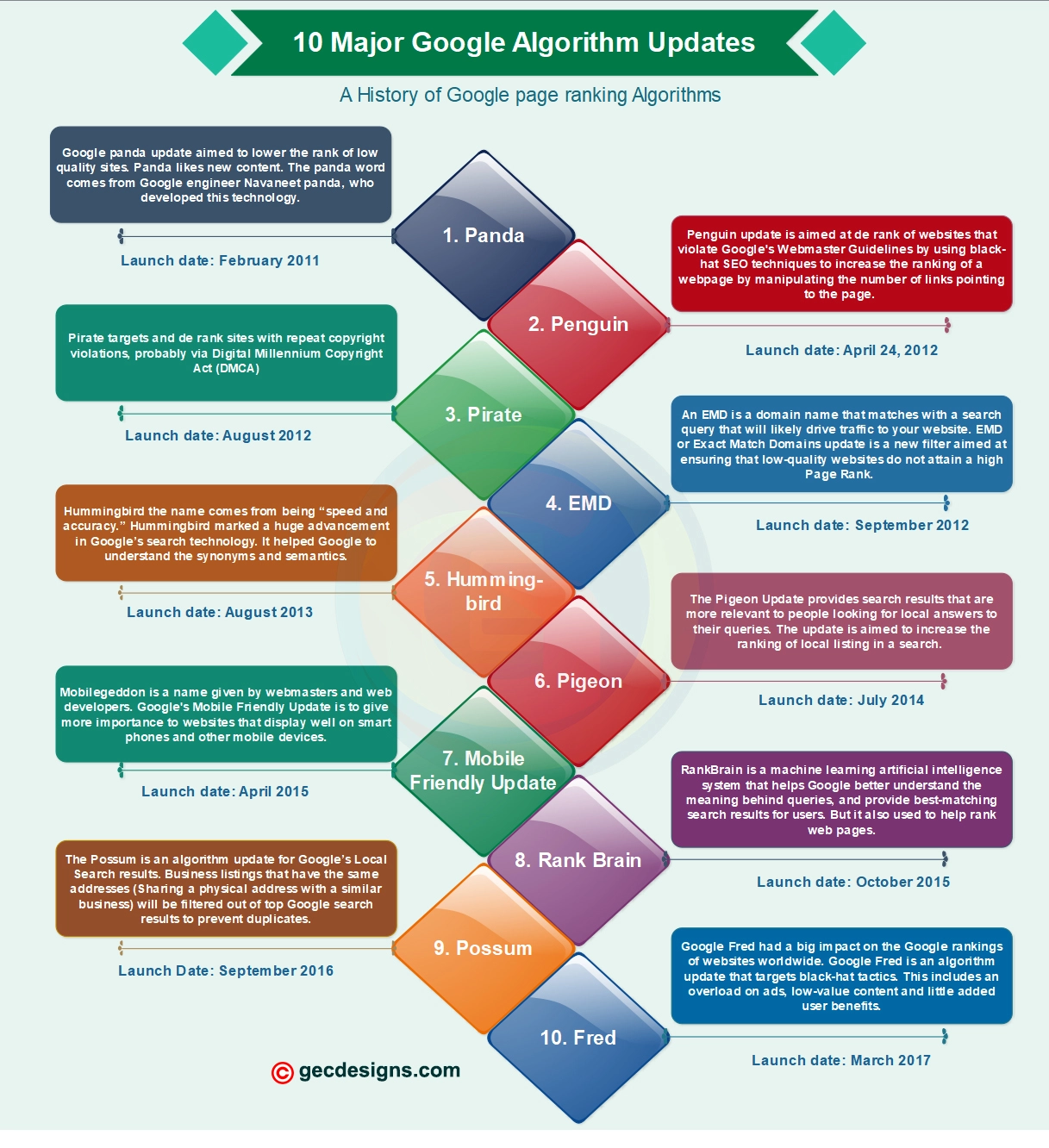Major Google algorithm updates - A Complete History
Google makes thousands of changes every year to improve the relevance and quality of the search results as possible. Google uses its algorithms to rank the websites on search engine result pages (SERP).
Most of the Google updates are tiny which have a lesser impact on search results, some updates are real-game changers and those may seriously shake up the SERPs. Some sites also get penalization which violates google’s policy.
Google’s algorithm updates are unannounced and it is really critical for marketers to know the pattern of google algorithm updates and changes.
Major Google algorithm updates
Here we have listed some major algorithm updates that allow you to understand how Google changed its algorithm over the past few years, what each of the updates was about, what the main hazards are, and how to get prepared for all of them.
1. Panda
2. Penguin
3. Pirate
4. EMD
5. Hummingbird
6. Pigeon
7. Mobile-Friendly Update
8. Rank Brain
9. Possum
10. Fred
11. Medic
12. BERT
A quick reference infographic on major Google algorithm updates.
Panda
Google Panda update aimed the low-quality sites and down-ranked them in search results. Panda likes new content. The panda word comes from Google engineer Navneet Panda, who developed this technology.
Launch date: February 2011, but it has several updates over the years.
Who is affected?
Onsite duplicate content - Similar content across your pages.
Off-site duplicate content - Similar content that appears on other sites.
Thin content - Inadequate amount of content on a page. Thin content pages are pages with a low word count that is filled with ads and affiliate links. If the page is under 200 words of content and over 100 links, that is the Thin content page.
Low-quality content - Low-quality content means a lack of depth of information.
Keyword stuffing - Keywords are loaded into a web page's Meta tags, visible content to boost search ranking. Keyword stuffing may lead to a website being banned or penalized.
Content farming - Content farms are also known as content mills and content factories. A content farm is a website that employs large numbers of freelance writers to generate large numbers of articles almost designed to satisfy search engines. The main purpose of a content farm is to maximize views and generate revenue by advertising.
Machine-generated content - Machine-generated content is information that is produced by digital devices.
Page speed - Even if you have the best content, if your site takes minutes to load, you cannot guarantee that users will stay.
Sites contain a large amount of advertising - Pages made up mostly of paid advertising rather than original content.
Poor grammar and spelling - Poor grammar or spelling makes your content hard to understand.
How to recover from Panda?
Create unique high-quality content. Remove duplicate content both internal and external- To check for instances of external content duplication, use a checker like Copyscape.
Tips to recover from Panda
* No pages with 1 or 2 paragraphs of text only.
* No page should have more than 100 links
* Delete or update low-quality blog posts.
* No page should be more than 3 clicks from the homepage
* Navigation should be clear and intuitive for the user
* Make sure your content is highly relevant to the user’s query
* Make sure that the pages are not dominated by ads or affiliate links
* Avoid auto-generated content
* Fix poor grammar issues
* Fix all your broken links.
* Provide contact information and address
* Provide a privacy policy
* Provide an “about us” page with biography/company history
Penguin
Penguin deals with link quality
Penguin update aimed at the websites and de-rank them who violate Google's Webmaster Guidelines to increase the ranking of a webpage by using manipulative link tactics.
Launch date: April 24, 2012
Who is affected?
* Paid links
* Links with over-optimized anchor text
* Links coming from spammy sites
* Links coming from irrelevant sites
* Hidden links and hidden texts
* Any other black hat SEO technique
How to recover from Penguin?
* Check your site internal linking
* Try to get links to pages with different anchor text.
* Avoid excessive link building.
* Get more quality backlinks. If you suspect your site has been negatively impacted by Penguin, you need to do a link audit and remove the low quality or spammy links.
* Avoid any kind of black-hat technique such as keyword stuffing and cloaking.
* Google introduced a tool called “disavow links tool” for check and remove toxic links from your site’s link profile. Disavow links on a domain level instead of disavowing the individual links.
Google Penguin updates
There have been several updates to the Penguin algorithm since it was launched in 2012. These are as follows,
Penguin 1 - April 24, 2012 - it affected more than 3 percent of search results, according to Google’s own estimations.
Penguin 2 - May 26, 2012 - it affected less than 0.1%
Penguin 3 - October 5, 2012 -. This was another data refresh. It affected queries in the English language, as well as affected international queries. It affected around 0.3% of queries
Penguin 4 - May 22, 2013 - also known as Penguin 2.0. This was the first Penguin update to look deeper than the website's homepage and top-level category pages for evidence of link spam being directed to the website. It affected 2.3% of English queries, as well as other languages proportionately.
Penguin 5 - October 4, 2013 - also known as Penguin 2.1. It affected around 1% of queries.
Penguin 6 - October 17, 2014 - also known as Penguin 3.0. Impacting less than 1% of English search queries.
Penguin 7 - September 23, 2016 - also known as Penguin 4.0
Pirate
Pirate update targets and penalized the websites that violate copyrights.
Google announced that any site with high numbers of valid Digital Millennium Copyright Act (DMCA) notices dropped in search rank positioning as a way to help users find legitimate, quality sources of content more easily.
Launch date: August 2012
Who is affected?
Websites illegally share material without valid consent from the owner.
How to recover from a Pirate?
If your site has been affected by pirate update follow these steps
* Check if your site has a DMCA takedown request submitted against it.
* You may talk to the complainant and can try to work out a way forward.
* After talking to the complainant you will probably need to make adjustments to your pages in order to meet the compliance.
* After that, ask for a written notice of compliance that you can pass on to Google.
12 Major Google algorithm updates insight, A History of Google page ranking algorithms
EMD
An EMD is a domain name that exactly matches a search query that will likely drive traffic to your website.
EMD or Exact Match Domains update is a new filter aimed at ensuring that low-quality websites do not attain a high Page Rank. Sites with stronger brand recognition and high-quality content were less likely to be hit.
For example, if your website name is “watch movies Online.com”.
The search query is ‘watch movies online’ then you might assume this is a shortcut to drive traffic to your website.
Launch date: September 2012
Tips for recovering from EMD update
* Improve your quality content.
* Don’t build an exact match domain name. Instead of targeting the exact keyword matching domain name, go with the partial match domain names.
* Don’t build exact match anchor texts to your website
* Don’t build exact match doorway pages
* Have plenty of pages and helpful content
* Don’t go over 2% keyword density
* Link to authority sites
* Use well-planned internal linking
* Add social share buttons to all of your content
Hummingbird
Hummingbird the name comes from being “speed and accuracy.”
Hummingbird marked a huge advancement in Google’s search technology. It impacted about 90 percent of searches worldwide. It helped Google to understand the synonyms and semantics.
Hummingbird is intended to make search engines more directed toward conversational search rather than keyword-based search. This concept is called semantic search.
Hummingbird is paying more attention to each word in a query. Google Hummingbird is a major algorithm change that has to do with interpreting search queries and providing more theme-related results in the SERPs that do not necessarily have the keywords from the query in their content. Hummingbird focuses on judging the intention of the individual who is searching for something online to determine what it is that they are looking to find.
Hummingbird is a reward-based change. Websites that fit the criteria of Hummingbird will notice better search engine rankings.
Launch date: August 22, 2013. They didn’t announce the change until September 26, 2013 (15th anniversary of Google)
Tips to improve your rank in hummingbird algorithm
* Content with more related keywords.
* Optimize the anchor texts with relevant keywords.
* Use of Knowledge Graph facts to ensure better search results.
* Expand your keyword research, focusing on synonyms and co-occurring terms to diversify your content
* Hummingbird is dedicated to using long-tail keywords. Those websites that use these long-tail keywords offer a lot of success.
* Pay more attention to universal search listing.
* Don’t create content for search engines. Create content for readers
* Create long-form, in-depth content.
Pigeon
The Pigeon Update provides search results that are more relevant and high-quality to people looking for local answers to their queries.
The update is aimed to increase the rankings of local listings in a search query. This update provides the results based on the user location and the listing available in the local directory.
Pigeon affects search results within Google Maps along with regular Google Web Search results. After the pigeon update, search results of the SERP for both Google Maps search and Google Search have a more uniform appearance.
Launch date: July 24, 2014
Who is affected?
* Poor on-page optimization
* NAP inconsistency ( Name, Address, Phone number)
How to recover from Pigeon?
* Create your Google my business page and make sure to categorize your correctly which allows your business displayed for relevant search queries.
* Ensure your contact information is always current and any listings associated with your business are accurate and complete.
* Don’t forget to create a solid business presence on reputed local directories in your niche.
* Make sure your business name, phone number, and address to be consistent across all your listings
* Include location, as well as product or service, in your landing page title.
* You should include a city or state into your website’s title tags.
* Having the name of core goods or services in your business name may give you some advantage.
Mobile-Friendly Update
Mobilegeddon is a name given by webmasters and web developers. Google's Mobile-Friendly Update is to give more importance to websites that display well on mobile devices. It ensures that mobile-friendly pages rank at the top of mobile search and de-rank pages that are not mobile-friendly.
Launch date: April 21, 2015.
How does it work?
The update affected the following areas:
It only affected the mobile search. The change does not affect desktop searches. This change will affect mobile searches in all languages worldwide and will have a significant impact on Google Search results.
Mobile-friendly sites should have the following factors
* The content must not be wider than the screen.
* Size your content to the screen in order to avoid users scrolling horizontally or zoom
* The text must be large enough to read without zooming.
* The site must avoid using software for mobile devices, such as Flash because the spider cannot read its content.
* Make pages load in less than a second on mobile devices
* Insert sufficient space between links to help people tap them
* All clickable parts on the website are easily clickable
Check your site by testing your pages with the Mobile-Friendly Test tool
If your website is affected by the update convert your website into a mobile responsive website.
Rank Brain
RankBrain is a machine-learning artificial intelligence system that helps Google better understand the meaning behind queries, and provide best-matching search results for users. But it also used to help rank web pages. Google also commented that RankBrain was the third most important factor in the ranking algorithm. The common understanding is that RankBrain, in part, relies on the traditional SEO factors such as links and content.
RankBrain identifies the relevant features on the pages in the index and arranges the results respectively in SERPs.
Launch date: October 26, 2015
To understanding the RankBrain we need to learn about machine learning and artificial intelligence. These both play a significant role in how RankBrain works
What is machine learning?
Machine learning is an application of artificial intelligence (AI) that helps existing computer systems automatically learn and improve from experience without being explicitly programmed. Machine learning takes user behavior and uses it to understand what works and what doesn’t.
What is artificial intelligence?
Artificial Intelligence is the broader concept of machines being able to carry out tasks in a way that the human mind works.
How does the rank brain work?
RankBrain uses machine learning to teach itself without the aid of humans. The key purpose of RankBrain is to deliver more relevant results by interpreting the meaning of whole phrases instead of focusing on individual words.
RankBrain identifies patterns behind different search queries. It uses these learned connections to understand similarities in future searches. It groups various complex queries together and associates them with the most valuable search results.
Who is affected?
* Shallow content
* Lack of query-specific relevance features
* Ways to Optimize for Rankbrain update
* Research the intent behind every keyword.
* Expand your keyword list beyond synonyms and variations
* Stop creating pages that target only one keyword or keyword phrase
* Focus on creating great content that provides value to your audience
* Write more posts and answer as many questions as you can.
* Optimize for people not for search engines
Possum
The Possum is an algorithm update for Google’s Local Search results. It filtered out business listings that have the same addresses (Sharing a physical address with a similar business) from top Google search results to prevent duplicates.
The prime motive of the Possum update is to diversify the local results and to put a serious end to the spammy practices. , Possum also gave a boost to businesses that are outside the physical city area.
Launch Date: September 1, 2016
Possum Update Recovery Tips
* Associate one physical address with one business
* Mention your city name when providing your location
* Focus more on location than other keywords
* Focus on every permutation and combination of your keywords.
* Provide consistent NAP details.
Fred
Fred got its name from Google's Gary Illyes, who jokingly suggested that all updates be named "Fred".
Google Fred had a big impact on the Google rankings of websites worldwide. Google Fred targets black-hat tactics. This includes an overload of ads, low-value content, and little added user benefits.
Google Fred looked at the quality of websites. Fred targets are the ones that violate Google's webmaster guidelines. However, the majority of websites affected by Fred are content sites that have a large number of ads and seem to have been created for the purpose of generating revenue.
Google Fred Update affected sites, reported traffic loss to their website of 50% or higher, and in some cases, websites saw a 90% traffic drop.
Launch date: March 8, 2017.
Who is affected?
* Excessive Ads
* Aggressive affiliate setups
* Content on all sorts of topics created for ranking purposes
* Invaluable or Unrelated Content
* Thin content
* Outdated content
* low-quality backlinks
* Mobile problems
* Aggressive monetization
How to recover from Fred?
* Remove duplicate and unrelated content
* Review Google’s webmaster guidelines.
* Review the placement of ads on your site
* Limit the number of ads on your website
* Update content along with keywords
* Avoid link pyramids, link exchange, and paid links
Medic
Google’s medic core algorithm update is for increasing the quality of search results. This update aimed to reward websites that had high-quality content in line with Google’s E-A-T (Expertise, Authoritativeness, and Trustworthiness) guidelines.
This update doesn’t target any specific niches. The name “Medic update” doesn’t mean that this update only targets health sites but it had a large impact on health and medical websites. It targets Your money your life (YMYL) category sites as well.
Google’s medic update also referred to as E-A-T update, YMYL update, and August update.
Launch date: August 1, 2018.
How to recover from Google Medic?
* Focus on producing quality, in-depth, and well-researched content.
* Include the author's profile on every blog page.
* Incorporate some online mentions, reviews, and testimonials for products and services to improve expertise score.
* Make sure that your website has about us and contact us page with an address.
* Include the date on blog posts and make sure to update the old articles regularly.
* Improve the user experience of your website, like increase loading speed, minimize redirects, avoid popups, etc.
* In case you are lack authority in your niche, try to build backlinks to your website from other websites to increase the authority signals.
* If you are not an expert in your content, try to get an expert to make content for you, and don’t forget to mention his/her profile in that blog post.
* Make sure that your website is secure.
BERT
BERT is one of Google’s biggest update since RankBrain in 2015.
BERT stands for Bidirectional Encoder Representations from Transformers that help Google to understand the intent behind search queries. It helps to understand the natural language and context of words in search queries and provide more relevant results.
Launch date: October 25, 2019.
How do you optimize for BERT?
* Create more unique, relevant, and compelling content
* Create content for users not for search engines.
* Organize your topic clearly
* Context is important more than keyword density.
* Prepare for conversational searches, use long-tail keywords.
* Keep your content fresh, avoid duplicate contents
These are the major Google updates along with some quick auditing and prevention tips to help your site in Google search. The basic process hasn’t changed. Follow the Google Webmaster Guidelines. Don’t ever chase an update. There will always be a way to get ahead of the competition. Stay focus on Google’s coming algorithm changes and improve your website up to date.

Rajanarthagi
Content writer and Marketer
An enthusiastic SEO expert, passion for digital marketing with two years of expertise in writing Digital Marketing and SEO content. She is a Master of Business Administration graduate from a reputed university in south India. Her passion for SEO and online marketing helps her to stay up to date with the trends and strategies. Follow her on social media sites, to stay up to date with SEO, and Digital Marketing, Updates. To contact Raji, visit the contact page.





